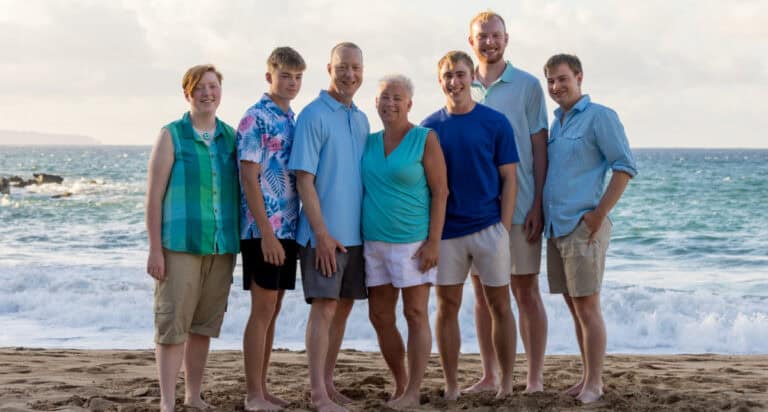Much is said about parents who struggle or refuse to respect their adult children’s boundaries, asking unwanted questions or offering unsolicited advice. But there is another type of boundary issue that creates ongoing struggles in families. Some parents struggle to set their own boundaries with adult children. In contrast to the parent who hates to hear no from their adult child, this parent never says no themselves.

Boundaryless parents say yes to their adult children to their own detriment
What can this look like? The boundaryless parent may say yes to requests from adult children, even to their own detriment. They offer more than they can afford to give reasonably. Boundaryless parents may struggle to voice their opinions to their children and allow their children to speak to them rudely. They struggle to admit when they feel hurt, so they swallow their pain and avoid conflict with their kids. They chronically put their children ahead of themselves, keep the peace, and never push back.
Boundaryless parents may experience themselves as simply loving, generous parents. Shouldn’t parents protect and care for their children? Isn’t it wonderful that they continue to give without restraint? And shouldn’t an adult child love this kind of relationship? They get everything they want with no pushback.
Who wouldn’t want a parent who meets their every need? While nice in theory, boundaryless relationships stress out parents and their children and can wreak havoc on a bond.
How boundaryless parents suffer
Boundaryless parents suffer both materially and relationally when they never say no. When they offer time they do not have, their other relationships suffer from neglect. When they offer money they cannot afford to give, they may compromise their financial future. And relationally, when parents fail to inject their needs into a conversation with their adult child and set limits on what they give, they can grow to resent their child’s requests and, eventually, the child themselves.
The short-term payoff of offering something needed and avoiding their child’s discomfort when they say no costs them the long-term relational integrity that comes from saying no, seeing that honored, and having a good relationship. Boundaryless parents may experience frustration, irritation, and burnout.
How adult children suffer when their parents don’t set boundaries
Though one would think adult children would enjoy the limitless giving of a boundaryless parent, adult children report that having a parent who never tells them no presents its own stressors. First, adult children cannot trust a parent who will not advocate for their needs and set limits.
Adult children of boundaryless parents may respond to their parents’ over-generosity by pulling back themselves, avoiding asking for things like babysitting, a ride to the airport, or reasonable financial help because they do not trust their parents not to overextend themselves. They worry the parent will offer more than they can afford to give and deny financial constraints.
Adult children with boundaryless parents also report constantly trying to read their parents’ subtle non-verbal cues because they cannot trust their parents to voice their own frustration. This can be as benign as guessing their parent’s favorite cuisine for dinner together because the parent is “fine with anything!”
Or it can look like trying to read whether their parent feels hurt by something the adult child said. The adult child must become an expert at reading the parent’s non-verbal cues of frustration and apologize for a perceived slight that the parent denies feeling. The whole process is exhausting because the adult child does the work of monitoring both their own emotions and their parents.
How the relationship between boundaryless parents and adult children suffers
In one scenario, a boundaryless parent can enable children who struggle to function in adult life. Some adult children may exploit their parent’s generosity and inability to set boundaries. These children may continue to live at home, drain a parent’s time and money, and never work through the hard parts of finding one’s way in the world.
For adult children suffering from addiction, the boundaryless parent will enable their child’s ongoing struggle. In these situations, other family members may eventually impose external limits on the parent and adult child because neither party can be trusted to do so.
Parents who struggle to voice their own hurt may unintentionally prevent the closeness their avoidance seeks to create. When two adults disagree, they rely on one another to voice what hurt them and what they need to rectify the situation. Parents who will not draw the line and say, “This hurt me,” will continue to get hurt because their children may not realize how their actions impact their parents.
Adult children never receive the gift of learning what their parent needs and honoring those needs. The irony is that the parent aims to protect the relationship by never rocking the boat, but never authentically speaking your mind means the relationship will always be superficial.
Boundaries from parents to children serve an important function. Knowing that somebody can and will say no when appropriate is important in adult relationships. It allows us to trust the other person to guard their own well-being.
Parents who struggle to set boundaries may feel resentful of their children and suffer burnout from overextension. Meanwhile, the adult child may feel resentment that the parent puts the onus on them to essentially set boundaries for their parents by constantly reading for cues that their request may be too much. A boundaryless parent’s yes never feels safe because their “no”s don’t exist. In contrast, when parents set appropriate boundaries, parents can joyfully offer what they can, and adult children can trust their parents to look out for themselves.
How can you begin to change the dynamic in a boundaryless relationship?
When parents begin to advocate for themselves, everybody involved may get uncomfortable. The parents may feel cruel for putting basic limits in place, voicing a preference, or admitting to feeling angry or hurt. Boundaryless parents are so used to not making waves that their words may initially feel like a tsunami.
Adult children, too, may bristle at their parents’ shifting behavior. The long-term payoff of a healthier parent/child bond comes with the short-term pain of no longer getting a singular say in how the relationship runs. Adult children may sit with the discomfort of being told no for the first time and making alternate arrangements.
Ultimately, parents and children will both feel relieved when the parent inserts themselves into the relationship more fully by speaking their mind. Parents can feel the relief of the enthusiastic yes when they mean it.
They can watch their child accept the legitimacy of their needs and opinions. Children can start to relax and trust their parents instead of having to read them so closely. And both parents and children can experience the closeness that comes from working through an issue instead of avoiding it by claiming nothing hurts.
That’s the thing about boundaries. Far from keeping family members separate, they form the parameters that help two people feel truly close.
More Great Reading:









